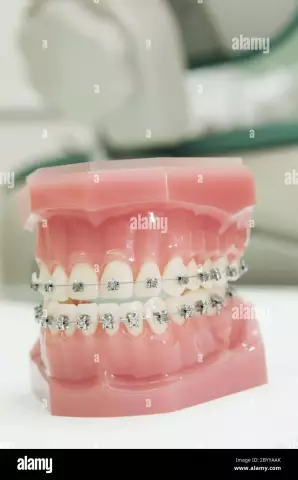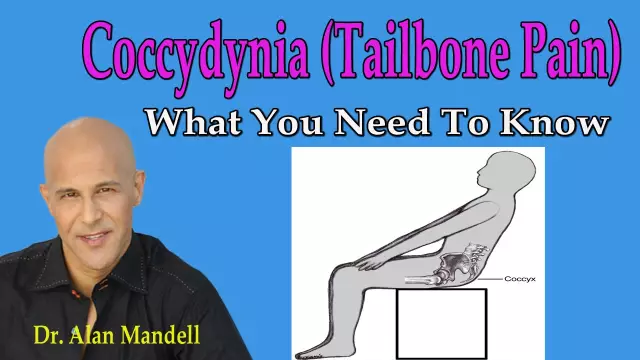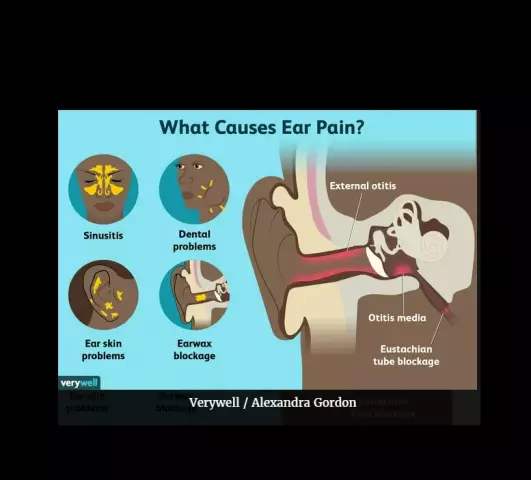- Author Rachel Wainwright wainwright@abchealthonline.com.
- Public 2023-12-15 07:39.
- Last modified 2025-11-02 20:14.
What causes the pain in the jaw

Jaw pain can be caused by a number of orthodontic reasons, such as an improper bite, or wearing braces or dentures. Sometimes it is a symptom of dental disorders: caries, pulpitis, periodontitis and others. For example, alveolitis of the hole provokes pain after an incorrect tooth extraction.
However, the main causes of jaw pain are:
- Injuries;
- Infectious and inflammatory diseases;
- Vascular pathology and peripheral nerve neuralgia;
- Tumors.
Jaw pain due to trauma
The intensity of the pain in the jaw is determined by the nature of the injury.
When the face is bruised, only soft tissues are damaged, so the bruises and swelling completely disappear within a few days.
Dislocation occurs, as a rule, with a sharp opening of the mouth. At this moment, there is a strong and sharp pain in the lower jaw and in the temporal region, while the mouth cannot be closed, and the jaw is pushed forward or slanted to the side.
Jaw fractures are the most dangerous. If the lower part is damaged, it is almost impossible to open the mouth. If the pain is in the upper jaw, then it is important to evaluate the accompanying symptoms. Bruises around the eyes, as well as liquorrhea and bleeding from the ears and nose mean a fracture of the base of the skull and require an immediate ambulance call.
Depending on the severity of the injury, jaw pain is treated differently. In case of bruising and dislocation, you should visit a trauma center and conduct an X-ray examination to exclude more serious injuries. In case of fractures, after clarifying the diagnosis, a special bandage is applied or surgical intervention is performed. Fractures of the base of the skull are treated only in a hospital.
If, after a while after recovery, the injury zone aches, it is recommended to consult a doctor, as this may be due to the following reasons:
- Damage to the necks, ligaments of the teeth and gums with the wire fixing the splint;
- Re-fracture with edema and hemorrhage;
- Massive trauma and nerve damage.
Pain in the jaw in inflammatory diseases
Infections are a fairly common cause of jaw pain.
Osteomyelitis is a purulent-inflammatory bone lesion. Trauma or untreated teeth are a source of jaw infection.
The disease can be recognized by the following signs:
- Sharp pain;
- Increase in body temperature up to 40 ° C;
- Swelling in the area of the pathological focus;
- Inflammation of the lymph nodes;
- Violation of facial symmetry.
Osteomyelitis can lead to serious complications. Therefore, in case of acute pain in the jaw in combination with the described symptoms, you should immediately consult a doctor.
Dysfunction of the temporomandibular joint can be a consequence of malocclusion, inflammation, or injury. At the same time, pain in the jaw, ears, and also other parts of the face is noted when yawning, chewing and tightly closing the teeth. Arthrosis is a degenerative joint lesion, characterized by crunching and constant aching sensations, which only intensify when the jaw moves. Arthritis is an inflammatory disease, the leading symptoms of which are cracking in the jaw and pain in the ears, as well as poor joint mobility. All pathologies of the temporomandibular joint are diagnosed exclusively during a medical examination and according to the results of an X-ray examination.
A number of inflammatory processes in the mouth and nose can produce acute pain in the jaw:
- Sinusitis occurs as a result of the penetration of infections through the sinuses or blood, as well as with a weakened immune system and improper treatment of rhinitis. The ailment is accompanied by difficulty breathing, pain in the upper jaw and between the eyes, as well as swelling of the eyelids;
- Glossitis results from infection through burns or other trauma to the tongue. At the same time, the lower jaw hurts, and taste buds also suffer;
- Phlegmons and abscesses develop with complications of angina or severe teething of wisdom teeth and affect the soft tissues under the tongue;
- Gingivitis is characterized by inflammation of the gum lining, fever, and bad breath.
Pathology of peripheral nerves and blood vessels
Jaw pain can be triggered by lesions of certain peripheral nerves:
- The trigeminal nerve is responsible for the innervation of the face. With neuralgia, nocturnal attacks appear, during which there is a pronounced burning sensation on the right or left side;
- The superior laryngeal nerve innervates the mucous membranes of the root of the tongue, larynx and part of the pharynx. Neuralgia causes intense one-sided pain under the lower jaw, which can spread to the face and chest. Often accompanied by coughing, drooling, and hiccups;
- The glossopharyngeal nerve supports the functioning of the stylopharyngeal muscle. The defeat of this nerve is characterized by short-term (no longer than 3 minutes) pain in the tongue, which radiates to the lower jaw, larynx and chest. Dry mouth is possible during an attack.

Treatment for jaw pain depends on the nature of the neuralgia. As a rule, medications are prescribed, and if they are ineffective, they resort to surgical transection of the nerves.
A normal blood supply is a prerequisite for the functioning of all tissues and organs of the human body, including the jaw. When it is violated, various symptoms immediately appear.
Pain in the jaw is noted with the following vascular pathologies:
- Arteritis of the facial artery is accompanied by a burning sensation, which is often localized under the lower jaw, at the site of the bend of the facial artery;
- The defeat of the carotid artery is not well understood and is considered as a type of migraine, in which pain occurs under the lower jaw and in the neck.
Chronic pain in the jaw with neoplasms
The following benign tumors are associated with chronic jaw pain:
- Osteoid osteoma causes pain in the jaw at night. It grows slowly and gradually leads to external asymmetry;
- Osteoblastoclastoma manifests itself as an increasing aching sensation when chewing. Over time, gum swelling introduces an imbalance in facial features;
- Adamantinoma is accompanied by thickening of the jaw and an increase in its size. The pain syndrome grows slowly, reaching a maximum in the later stages of the disease.
Often, benign and malignant tumors have similar clinical signs, and only special studies help to distinguish them from each other.
- Cancer quickly leads to loosening and tooth loss. Pain in the jaws, not too pronounced at first, increases significantly over time;
- Sarcoma is characterized by rapid growth and is accompanied by intense shooting pains. However, in the initial stages, there is a slight decrease in skin sensitivity;
- Osteosarcoma is characterized by moderate pain for a long period, which increases with palpation.
In the treatment of malignant tumors, surgery, radiation therapy, chemotherapy and alternative methods are practiced.
Found a mistake in the text? Select it and press Ctrl + Enter.






